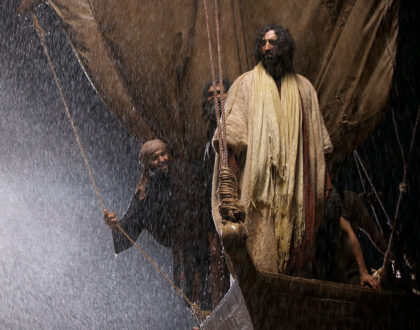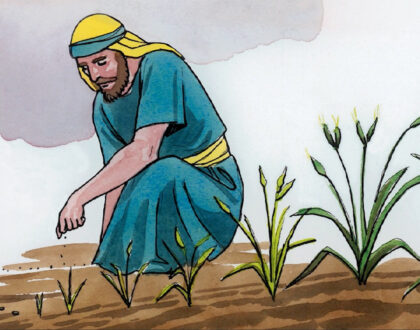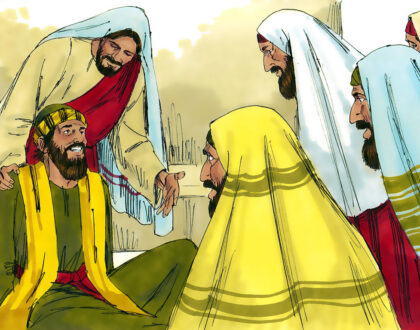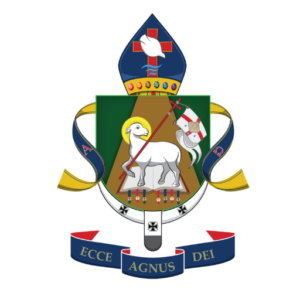He Set the Captives Free
“He Set the Captives Free”
Archbishop Loren Thomas Hines
Holy Saturday
March 26, 2016
Readings: Job 14:1-14, Psalm 130
1 Peter 4:1-8
John 19: 38-42
In the beginning of life, man had little understanding of life and the purpose of his creation. “You are dust and to dust you shall return” was the reality for many and we are reminded of this on Ash Wednesday. But this statement refers to the flesh. The reality in the spirit is different. God gradually told man that life is eternal because he is made in God’s image and God does not have an end. God’s image is imprinted in man, in his very heart. The idea of eternal life was planted and man began to see this as his new reality. Man began to see Sheol as a holding place; this is why Job said to God, “hold me until Your anger is finished”.
One of the very first messages of life after death is found in Ezekiel 37 when God gave the prophet a vision of the valley of dry bones. These dry bones came back to life – the bones came together, the sinews and flesh grew and skin covered them, as the prophet prophesied to them. “Then breath came into them, and they came to life and stood on their feet, an exceedingly great army.” (Ezekiel 37:10) This is a story of resurrection. Man was given this symbolism of the valley of dry bones to tell him that death is not the end. In cemeteries, mausoleums are constructed to house the dead because it is believed that it is their end; they are not seen as living again. Scriptures tell us that death is only temporary. The Old Testament shows this through symbols. In the New Testament, we are given the truth that God’s will for man is eternal life.
Christ’s tomb was sealed making it impossible to escape. Today, we put the dead in caskets, and then seal their tomb with concrete. It’s as if death is saying to them, “I got you; you can’t escape”. Christ’s tomb was sealed. The image in our mind is that Christ is dead. “For Christ also died for sins once for all, the just for the unjust, so that He might bring us to God, having been put to death in the flesh but made alive in the spirit; in which also He went and made proclamation to the spirits now in prison.” (1 Peter 3:18-19) So even as we see Christ’s body sealed in a tomb, He was not resting but was busy working. He went to hell (Sheol, Hades or the place of death controlled by the enemy) and ministered to the souls imprisoned there and brought them out of that dark, dark place.
Josephus, a Jewish historian (who didn’t believe that Christ is the Messiah) wrote that after the resurrection of Christ, some who had died were seen walking around Jerusalem. This had to happen because there had to be a witness that Jesus went to Sheol to free man from death. I see this as one of the most awesome events in history. Satan was fighting against God. He was lord of the world because Adam handed it to him. At Christ’s birth, he wondered if He was the One sent to destroy him. At Christ’s baptism, the Father proclaimed, “This is My Beloved Son”. From then on, Satan had plotted to kill Christ. He worked in the hearts of the religious, influencing them to destroy the Lord. The enemy also put in the hearts of the people to choose to set free Barabbas over the Lord. Imagine his glee when he saw Christ on the cross. But like the story of the vineyard where the hired keepers killed even the son sent by the owner but in the end didn’t get what they wanted which was ownership of the vineyard, the enemy lost. He thought he won the battle with the Lord. He probably proclaimed this victory to his minions in hell and they may have celebrated with a party thinking that they already had control of the world. Then Christ arrived at their party and breaks through, shattering the gates of hell. His Spirit having been freed, the power of God was working mightily through Him. Imagine how the devil must have bellowed in fear. The gates of hell were harrowed and crushed! Christ had to go to hell to set free those imprisoned there, the first one to be set free being Adam (he was the first-born of God), because in saving mankind, God had to include those who died before Christ’s sacrifice on the cross.
On this day, while we see Christ as dead and powerless, He was actually setting free those who were imprisoned in hell. “When He ascended on high, He led captive a host of captives and He gave gifts to men. Now this expression ‘He ascended’, what does it mean except that He also had descended into the lower parts of the earth? He who descended is Himself also who ascended far above all the heavens, so that He might fill all things.” (Ephesians 4:8-10) Paul proclaimed this even if it isn’t in the Gospels because the Spirit revealed it to him. We were given gifts because we’ve been set free.
We wonder what happens when people die. Hebrews talks about a cloud of witnesses cheering us on. We are not alone; our loved ones who went before us are around us, praying for us and ministering to us. What hope! We believe they are in heaven, but where is heaven? Could heaven be what happens to us when we have the Kingdom of God in us? Our loved ones who left before us are cheering us on, asking us to get the work of God done so that they can finally receive their reward; because they can’t get their reward until we complete the job.
In Luke 23:43, Jesus tells the thief, “Today you shall be with Me in Paradise”. When life seems to pass, we are with Him. Paul said in 2 Corinthians 5:8, “We are of good courage and prefer rather to be absent from the body and to be at home with the Lord”. After passing from this life to the next, we become present with the Lord. He also said in Philippians 1:21 that “to live is Christ and to die is gain”. Death is not a punishment, not an end but an advancement to another realm. Jesus tells that because He lives, we too shall live. Death then loses its power; loses its sting.
1 Corinthians 15:50-53 “Flesh and blood cannot inherit the kingdom of God; nor does the perishable inherit the imperishable. Behold, I tell you a mystery; we will not all sleep, but we will all be changed….for this perishable must put on the imperishable, and this mortal must put on immortality.” This is God’s provision for the flesh – the spirit and the body will be reunited one day, like the dry bones in Ezekiel. Death is not an end. “For our citizenship is in heaven, from which also we eagerly wait for a Savior, the Lord Jesus Christ who will transform the body of our humble state into conformity with the body of His glory….” (Philippians 3:20-21) Christ will change us and we will be like Him. “When we see Him, we will know Him because we will be like Him.”
This day is not about the enemy winning the battle but about Christ facing the battle and emerging victorious. Joseph of Arimathea took the body of Christ into his tomb and brought with him 100 lbs of spices to preserve the Lord’s body, even if Christ didn’t need it; because God would bring Him back to life. This day was set aside to give honor to Christ’s death. There was a time in this country when no one dared to leave their homes on this day because Christ was dead. People had such reverence for this day. Sadly, we have forgotten to honor this day.
Today let us honor Christ and what He has done for us. Let’s give Him the honor and respect He deserves. Christ paid the ultimate price for us, not because of our sin but because of His love for us. He deserves our honor, respect and love.
Recent Sermons

Jesus, Calmer Of Storms
June 23, 2024

Harvest Time Stemming From The Smallest Seed
June 17, 2024

Not Bound By Limitations To Minister
June 10, 2024

